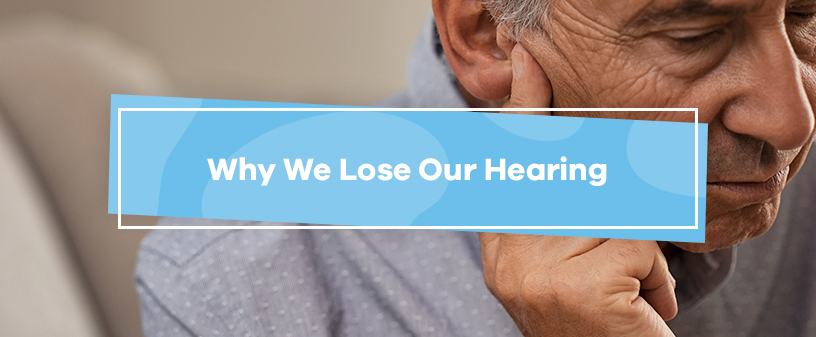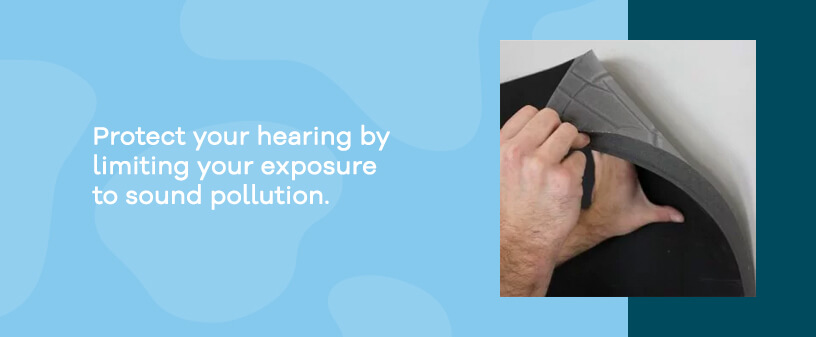
What’s one of the most common health concerns in the United States? You may be surprised to learn it’s hearing loss. Around 48 million people in the country — that’s 20% of the population — have trouble hearing. So, what causes our loss of hearing, and can we prevent it?
How We Hear
To understand why we lose our hearing and how to prevent hearing loss, we need to understand how our hearing works. The process has several steps:
- Sound waves: The sounds around us consist of sound waves, which go into our outer ear. From there, they travel through the ear canal.
- Eardrum: The eardrum at the end of the ear canal starts to vibrate because of the sound waves. These vibrations get sent to the stapes, malleus and incus, which are bones in the middle ear.
- Inner ear: The stapes, malleus and incus magnify the vibrations, so they can reach the cochlea in the inner ear. The cochlea is filled with fluid and the vibrations make this fluid move, creating a wave. Different hair cells near the cochlea can detect different pitches of sound.
- The brain: The hair cells move, eventually causing chemicals to enter the cells. This movement creates electrical signals, which the auditory nerves carry to the brain. The brain then interprets the electrical signals.
Causes of Hearing Loss
Hearing loss happens for multiple reasons. In fact, five categories of hearing loss exist:
- Inherited: More than 400 genetic diseases, like Stickler syndrome, can cause hearing loss. While some people are born with their hearing damaged, others lose their hearing over time.
- Age-related: Presbycusis is a fancy word for age-related hearing loss. As you may know from spending time with your relatives or maybe even older coworkers, losing your hearing is an unfortunate part of aging. Age-related hearing loss happens because of changes in your inner ear, though shifts in your middle ear can also cause your hearing to fade. Conditions like heart disease and high blood pressure also impact your hearing because they affect your ears’ blood supply. Most hearing loss occurs during your 60s, according to the National Institute on Deafness and Other Communication Disorders (NIDCD).
- Noise-induced: Whether it’s the construction outside your apartment or your love of football, continued exposure to loud noises cause hearing loss. In fact, 15% of children between the ages of 6 and 19 have hearing loss. Like age-related hearing loss, it’s your inner ear that takes the hit. Whether it’s Taylor Swift telling you to “Shake It Off” or a herd of cows saying “Good mooorning,” noise can damage your ear’s hair cells, depending on the decibels.
- Illness-related: Non-inherited diseases can also cause hearing loss. Ménière’s disease, which affects your inner ear, and Otosclerosis, which impacts your middle ear, are two examples of illnesses that lead to temporary or permanent hearing loss. Tumors may also result in hearing loss, whether they’re benign or malignant.
- Trauma: Accidents happen, but when your head takes the hit, you may end up with damage to your hearing. It’s crucial to see a doctor after a head injury to check for any serious consequences, whether that’s a concussion or hearing loss.
- Medication: That’s right, even medicine can cause hearing loss. These drugs are called ototoxic, meaning toxic to the ear, and cause permanent hearing loss. Ototoxic medication includes chemotherapy medicine, aspirin, non-steroidal anti-inflammatory drugs (NSAIDs) and aminoglycoside antibiotics. The good news is hearing loss often doesn’t occur without taking significant amounts of these medications.
Knowing the causes of hearing loss answers the question of, “Why do you lose your hearing?” but also leads to a great follow-up question: “How can you protect your hearing?”
Preventing Hearing Loss

You can’t turn back the clock, but you can work to prevent future hearing loss. Here’s how:
- Ask your doctor about drug side effects: Knowing the potential side effects of your prescription medicine is smart. Before your doctor writes you a prescription, ask them if hearing loss is a possible side effect. If it is, see if there’s another medicine your physician can recommend.
- Use hearing protection: Ear plugs, noise-blocking earmuffs or noise-canceling headphones are all options for protecting yourself from noise-induced hearing loss. If you work in a noisy career field, protective ear gear is essential.
- Limit your exposure to noise pollution: Protect your hearing by limiting your exposure to sound pollution. Turn down the radio, wear ear plugs to the game and soundproof your apartment’s walls from the non-stop construction outside.
Limit your chemical exposure: Certain toxic chemicals, including some solvents and pesticides, can cause hearing loss. If you work in an environment where you may be exposed to hazardous materials, make sure you understand the risks and wear the right protective equipment at all times, including gloves and eye protection.
Just as we protect ourselves from sun damage by wearing sunglasses, hats and sunscreen, we can follow through with these hearing loss prevention tips to keep our ears happy and healthy.
How To Tell if You Have a Hearing Problem
There are many reasons why people lose their hearing. Learning how to prevent hearing loss is important because, typically, changes to hearing are subtle. You may not notice you’re losing your hearing until the problem is advanced.
Early detection can help you get treatment more quickly, which is why you’ll want to keep alert for these signs of hearing loss:
- You notice you can’t hear higher-pitched sounds.
- Some sounds, like the radio, seem muffled.
- You find yourself turning up the volume on your car radio, computer, mobile device and other devices.
- You’re asking people to repeat themselves or to speak up.
- You’re having trouble hearing in regular situations, such as over the phone, in movie theaters or in settings where others can hear well.
- You hear a ringing sound in your ears.
- There is pain in your ears, especially when you’re exposed to certain sounds.
What to Do if You Have a Hearing Problem
If you notice any signs of hearing loss, visit your doctor promptly. There are many treatments available today that can help address different types of hearing loss, from removing ear wax to surgical procedures. Treatments and other options, such as cochlear implants and hearing aids, can help you hear more clearly.
In addition to seeing your doctor, you’ll want to take steps to prevent further hearing loss. Use earplugs or protective equipment if you work in a loud environment and turn down your music or TV you’re watching to protect your hearing. If you live or work somewhere with noise, consider some of the products Soundproof Cow offers to enjoy a quieter space that safeguards your ears. Taking action now can help prevent further noise-related hearing loss.
Want to Learn More?
Interested in learning more about hearing, noise and soundproofing? Subscribe to our Bull Bulletin for the latest information and tips from our herd here at Soundproof Cow.






